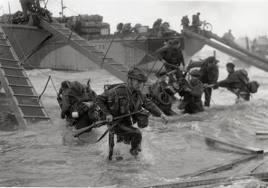"To do anything in this world worth doing, we must not stand back shivering and thinking of the cold and danger, but jump in, and scramble through as well as we can."
– Sydney Smith
D-Day. The mention of D-Day usually conjures up the invasion of the Normandy Beaches on June 6, 1944, bloody battles that ensued, and ultimately liberation from German occupation during World War II. In Sex Addiction treatment with addicts, spouses, and couples that I sit with, we sometimes refer to two D-days. The first D-Day we refer to as “Discovery Day”. The second D-Day is “Disclosure Day”.
The Discovery Day, in my mind parallels the initial invasion. The D-Day invasion in 1944 involved 5,000 ships carrying men and vehicles across the English Channel, 800 planes that dropped over 13,000 men in parachutes, and 300 planes that dropped bombs on German troops that defended the beaches. The result was 100,000 Allied troops made it to shore that day. I wish no disrespect to those who physically endured the battle of WW II, but in my mind of sitting with couples in sex addiction, there is a metaphorical parallel. Can you imagine the power of this assault? When discovery happens for the spouse there is an invasion.  Life, as they knew or thought it to be, changes in an instant. PTSD from the trauma continues as they lose so much in the transaction of the discovery invasion. The spouse of the addict loses their way, their orientation to life, and the things they thought that were, aren’t. They lose the feelings of specialness to their spouse that was felt in the marriage. It is a betrayal like no other. For the addict there are casualties, as well. The addict is often caught by a surprise attack. They are left to defend the territory of addiction. They are lost in a world of disorientation from the occupation of the addiction and the shame of being discovered. It is a difficult labyrinth for both sides of the war at this point. I have both spouses and addicts contact me in the aftermath of discovery. I can assure you it is painful and the wounds are severe for both soldiers in the opposing armies.
Life, as they knew or thought it to be, changes in an instant. PTSD from the trauma continues as they lose so much in the transaction of the discovery invasion. The spouse of the addict loses their way, their orientation to life, and the things they thought that were, aren’t. They lose the feelings of specialness to their spouse that was felt in the marriage. It is a betrayal like no other. For the addict there are casualties, as well. The addict is often caught by a surprise attack. They are left to defend the territory of addiction. They are lost in a world of disorientation from the occupation of the addiction and the shame of being discovered. It is a difficult labyrinth for both sides of the war at this point. I have both spouses and addicts contact me in the aftermath of discovery. I can assure you it is painful and the wounds are severe for both soldiers in the opposing armies.
Scholars of WWII note that D-Day probably referred to Decision Day. The success of the campaign of 1944 involved pushing the front of the occupied forces back after the initial invasion. The Second D-Day of sex addiction is Disclosure Day. Disclosure Day has the possibility of the same purpose. The success in sex addiction treatment also involves pushing the front of addiction back so the occupation of addiction no longer continues. Disclosure has the potential to create liberation for the addict and possibly the relationship. It certainly helps to begin pushing the fronts of addiction back so that freedom from living in the occupation of addiction can begin. Disclosure helps the addict begin to reduce shame, shed long-held secrets which feed a shame spiral that feed addiction, and liberate one to a life of living transparently. For the spouse, disclosure helps them understand what has been long-held in secret behind the front. They can decide if they wish to work on the relationship after they hear what the addict has had to say. Disclosure can lay the foundation for a new foundation of intimacy in a relationship.
Disclosure is not for everyone, but it is highly recommended for most treatment plans. Disclosure is not recommended until sobriety is established to give the addict a chance to gain his bearings, develop a supportive network to deal with shame, and give a full account of acting out from a sober mind. Disclosure is not just coming clean in confession after the discovery. Disclosure must be planned and executed as carefully as the Normandy Invasion was planned for. To haphazardly just rush in could be disastrous for the campaign of winning the war. Disclosure should be done purposefully with the skill of trained therapists with experience of how to structure disclosure for the maximum chance of success. Certified Sex Addiction Therapists (CSAT’s) are uniquely trained in facilitating disclosure processes.
Disclosure is not just coming clean in confession after the discovery. Disclosure must be planned and executed as carefully as the Normandy Invasion was planned for. To haphazardly just rush in could be disastrous for the campaign of winning the war. Disclosure should be done purposefully with the skill of trained therapists with experience of how to structure disclosure for the maximum chance of success. Certified Sex Addiction Therapists (CSAT’s) are uniquely trained in facilitating disclosure processes.
Wars rage on when both sides fight for an impossible ideal. Sometimes when one retreats from an ideal it gives the opposing army a chance to re-evaluate. For healing with couples and sex addiction treatment, we have to arrest the addiction first. Everyone must look at how they engaged in the battle previous to discovery. Addiction has raged for a variety of reasons that must be addressed. Couples need to be helped with how to put down their weapons. They need help to assess their wounds, and evaluate the ideals that are worth fighting for. They need to negotiate openly post-disclosure rather than be on the attack. Recovery is a process of new skills, new boundaries on the frontier, and new ways of empowering oneself. It can be very liberating for all.
 For the person whose life has been plagued by secret shame and finally has the courage to make the call for help, the pain is palpable. For the spouse who has stumbled upon information of a secret life kept hidden by their partner and now questions the reality of an entire relationship, the level of pain has profound impact on this therapist.
For the person whose life has been plagued by secret shame and finally has the courage to make the call for help, the pain is palpable. For the spouse who has stumbled upon information of a secret life kept hidden by their partner and now questions the reality of an entire relationship, the level of pain has profound impact on this therapist. 
 Life, as they knew or thought it to be, changes in an instant. PTSD from the trauma continues as they lose so much in the transaction of the discovery invasion. The spouse of the addict loses their way, their orientation to life, and the things they thought that were, aren’t. They lose the feelings of specialness to their spouse that was felt in the marriage. It is a betrayal like no other. For the addict there are casualties, as well. The addict is often caught by a surprise attack. They are left to defend the territory of addiction. They are lost in a world of disorientation from the occupation of the addiction and the shame of being discovered. It is a difficult labyrinth for both sides of the war at this point. I have both spouses and addicts contact me in the aftermath of discovery. I can assure you it is painful and the wounds are severe for both soldiers in the opposing armies.
Life, as they knew or thought it to be, changes in an instant. PTSD from the trauma continues as they lose so much in the transaction of the discovery invasion. The spouse of the addict loses their way, their orientation to life, and the things they thought that were, aren’t. They lose the feelings of specialness to their spouse that was felt in the marriage. It is a betrayal like no other. For the addict there are casualties, as well. The addict is often caught by a surprise attack. They are left to defend the territory of addiction. They are lost in a world of disorientation from the occupation of the addiction and the shame of being discovered. It is a difficult labyrinth for both sides of the war at this point. I have both spouses and addicts contact me in the aftermath of discovery. I can assure you it is painful and the wounds are severe for both soldiers in the opposing armies. Disclosure is not just coming clean in confession after the discovery. Disclosure must be planned and executed as carefully as the Normandy Invasion was planned for. To haphazardly just rush in could be disastrous for the campaign of winning the war. Disclosure should be done purposefully with the skill of trained therapists with experience of how to structure disclosure for the maximum chance of success.
Disclosure is not just coming clean in confession after the discovery. Disclosure must be planned and executed as carefully as the Normandy Invasion was planned for. To haphazardly just rush in could be disastrous for the campaign of winning the war. Disclosure should be done purposefully with the skill of trained therapists with experience of how to structure disclosure for the maximum chance of success.